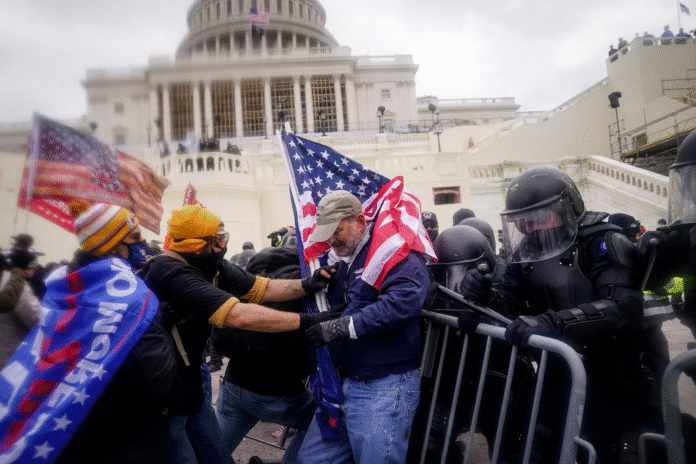
The Department of Justice has reached a preliminary settlement agreement with the family of Ashli Babbitt, the woman fatally shot during the January 6, 2021, Capitol riot — a moment that remains one of the most polarizing and emotionally charged episodes in recent American history.
The Babbitt family had filed a wrongful death lawsuit against the federal government in January 2024, seeking $30 million in damages. The legal claim centered on their assertion that Babbitt was unlawfully killed by U.S. Capitol Police Lt. Michael Byrd, who fired the single, fatal shot as she attempted to climb through a shattered window leading to the Speaker’s Lobby — a corridor that, at that moment, shielded lawmakers and staff under siege from a violent mob.
Though cleared of any misconduct in a formal investigation, Byrd’s actions have remained a lightning rod for debate, caught between differing narratives of heroism, accountability, and political symbolism.
A Settlement, Not a Verdict
At a recent emergency hearing before federal Judge Ana Reyes in Washington, D.C., attorneys for Babbitt’s estate announced that an agreement “in principle” had been reached. The specifics of the deal were not disclosed, but the family’s lawyer, Robert Sticht, indicated they expected to sign the formal settlement within three weeks.
The emergency nature of the hearing stemmed from a dispute over attorney compensation. One of Babbitt’s former lawyers had filed a motion seeking a preliminary injunction to ensure he would be paid for his past involvement in the case, should the deal be finalized.
While settlements often allow parties to avoid the unpredictability of trial, they also tend to leave many questions unresolved in the public eye. For supporters of Babbitt, a settlement may feel like a partial acknowledgment of wrongdoing — or, at the very least, institutional overreach. For others, especially those who defend Byrd’s split-second decision to protect lawmakers, it’s a pragmatic resolution to a tragic but legally justified use of force.
The Shooting That Shook the Nation
Ashli Babbitt, a 35-year-old Air Force veteran and staunch supporter of former President Donald Trump, became a central figure in the storming of the Capitol. Captured on video, her final moments — pushing through a barricaded entryway while lawmakers hid just steps away — were broadcast to a shocked nation.
Byrd, who had his weapon drawn and repeatedly warned the mob not to proceed, fired one shot as Babbitt attempted to breach the final threshold. She later died from her injuries.
The U.S. Capitol Police and the Department of Justice both conducted thorough reviews of the incident and concluded that Byrd’s actions were justified. Officials pointed to the immediate danger posed by the advancing rioters, the structural vulnerability of the House chamber, and the need to protect those sheltering inside.
Despite these conclusions, the event was quickly politicized. To some, Babbitt became a martyr — a symbol of government overreach and what they saw as a politically motivated use of deadly force. To others, she was part of an aggressive mob seeking to upend democracy, and her death, while tragic, was a consequence of her actions in a volatile situation.
Political Reverberations
Former President Donald Trump has frequently invoked Babbitt’s name in speeches and interviews, calling her death a “disgrace” and suggesting that she was wrongfully killed. Though he claimed in a March 2025 Newsmax interview that he was unaware of her family’s lawsuit, he reaffirmed his admiration for Babbitt and his desire to “look into” the situation.
“I’m a big fan of Ashli Babbitt,” Trump said. “She was a really good person… innocently standing there… and a man did something unthinkable to her when he shot her.”
Trump’s support has ensured that Babbitt remains a potent symbol within certain political circles. Her mother, Micki Witthoeft, has attended multiple congressional hearings, including a House Judiciary session focused on the origins of FBI investigations into Trump’s 2016 campaign — further entwining her daughter’s memory with the broader political disputes over January 6 and its aftermath.
A Nation Still Divided
The proposed settlement does not resolve the moral, political, or emotional questions surrounding January 6. Nor does it erase the bitter divisions that continue to characterize American public discourse nearly five years after the riot. For Babbitt’s family, the settlement might offer closure. For others, it may reopen wounds or feel like an undeserved concession.
At its heart, this agreement underscores a national tension: the push and pull between justice, accountability, and political identity in the post-Trump era. It is a reminder that even a single death — especially one caught on camera in the center of an unprecedented attack on American democracy — can ignite long-standing battles over truth and consequence.
As the nation continues to process the events of January 6 and their ripple effects, the Ashli Babbitt case remains a stark example of how justice is rarely simple — and how, sometimes, it is quietly negotiated rather than publicly declared.


